- Home
- J. R. R. Tolkien
The Book of Lost Tales, Part One Page 7
The Book of Lost Tales, Part One Read online
Page 7
The Seven Stars, and through the boughs the eye
Stares down cold-gleaming in the high moon’s face.
100
O Elder Kindred, fair immortal folk!
You sing now ancient songs that once awoke
Under primeval stars before the Dawn;
You dance like shimmering shadows in the wind,
As once you danced upon the shining lawn
105
Of Elvenhome, before we were, before
You crossed wide seas unto this mortal shore.
Now are your trees, old grey Kortirion,
Through pallid mists seen rising tall and wan,
Like vessels vague that slowly drift afar
110
Out, out to empty seas beyond the bar
Of cloudy ports forlorn;
Leaving behind for ever havens loud,
Wherein their crews a while held feasting proud
In lordly ease, they now like windy ghosts
115
Are wafted by cold airs to friendless coasts,
And silent down the tide are borne.
Bare has your realm become, Kortirion,
Stripped of its raiment, and its splendour gone.
Like lighted tapers in a darkened fane
120
The funeral candles of the Silver Wain
Now flare above the fallen year.
Winter is come. Beneath the barren sky
The Elves are silent. But they do not die!
Here waiting they endure the winter fell
125
And silence. Here I too will dwell;
Kortirion, I will meet the winter here.
IV
Mettanyë*
I would not find the burning domes and sands
Where reigns the sun, nor dare the deadly snows,
Nor seek in mountains dark the hidden lands
130
Of men long lost to whom no pathway goes;
I heed no call of clamant bell that rings
Iron-tongued in the towers of earthly kings.
Here on the stones and trees there lies a spell
Of unforgotten loss, of memory more blest
135
Than mortal wealth. Here undefeated dwell
The Folk Immortal under withered elms,
Alalminórë once in ancient realms.
I conclude this commentary with a note on my father’s use of the word Gnomes for the Noldor, who in the Lost Tales are called Noldoli. He continued to use it for many years, and it still appeared in earlier editions of The Hobbit.†
In a draft for the final paragraph of Appendix F to The Lord of the Rings he wrote:
I have sometimes (not in this book) used ‘Gnomes’ for Noldor and ‘Gnomish’ for Noldorin. This I did, for whatever Paracelsus may have thought (if indeed he invented the name) to some ‘Gnome’ will still suggest knowledge.* Now the High-elven name of this people, Noldor, signifies Those who Know; for of the three kindreds of the Eldar from their beginning the Noldor were ever distinguished both by their knowledge of things that are and were in this world, and by their desire to know more. Yet they in no way resembled the Gnomes either of learned theory or popular fancy; and I have now abandoned this rendering as too misleading. For the Noldor belonged to a race high and beautiful, the elder Children of the world, who now are gone. Tall they were, fair-skinned and grey-eyed, and their locks were dark, save in the golden house of Finrod…
In the last paragraph of Appendix F as published the reference to ‘Gnomes’ was removed, and replaced by a passage explaining the use of the word Elves to translate Quendi and Eldar despite the diminishing of the English word. This passage—referring to the Quendi as a whole—continues however with the same words as in the draft: ‘They were a race high and beautiful, and among them the Eldar were as kings, who now are gone: the People of the Great Journey, the People of the Stars. They were tall, fair of skin and grey-eyed, though their locks were dark, save in the golden house of Finrod…’ Thus these words describing characters of face and hair were actually written of the Noldor only, and not of all the Eldar: indeed the Vanyar had golden hair, and it was from Finarfin’s Vanyarin mother Indis that he, and Finrod Felagund and Galadriel his children, had their golden hair that marked them out among the princes of the Noldor. But I am unable to determine how this extraordinary perversion of meaning arose.†
II
THE MUSIC OF THE AINUR
In another notebook identical to that in which The Cottage of Lost Play was written out by my mother, there is a text in ink in my father’s hand (and all the other texts of the Lost Tales are in his hand, save for a fair copy of The Fall of Gondolin*) entitled: Link between Cottage of Lost Play and (Tale 2) Music of Ainur. This follows on directly from Vairë’s last words to Eriol on p. 20, and in turn links on directly to The Music of the Ainur (in a third notebook identical to the other two). The only indication of date for the Link and the Music (which were, I think, written at the same time) is a letter of my father’s of July 1964 (Letters p. 345), in which he said that while in Oxford ‘employed on the staff of the then still incomplete great Dictionary’ he ‘wrote a cosmogonical myth, “The Music of the Ainur”’. He took up the post on the Oxford Dictionary in November 1918 and relinquished it in the spring of 1920 (Biography pp. 99, 102). If his recollection was correct, and there is no evidence to set against it, some two years or more elapsed between The Cottage of Lost Play and The Music of the Ainur.
The Link between the two exists in only one version, for the text in ink was written over a draft in pencil that was wholly erased. In this case I follow the Link with a brief commentary, before giving The Music of the Ainur.
‘But,’ said Eriol, ‘still are there many things that remain dark to me. Indeed I would fain know who be these Valar; are they the Gods?’
‘So be they,’ said Lindo, ‘though concerning them Men tell many strange and garbled tales that are far from the truth, and many strange names they call them that you will not hear here’ but Vairë said: ‘Nay then, Lindo, be not drawn into more tale-telling tonight, for the hour of rest is at hand, and for all his eagerness our guest is way-worn. Send now for the candles of sleep, and more tales to his head’s filling and his heart’s satisfying the wanderer shall have on the morrow.’ But to Eriol she said: ‘Think not that you must leave our house tomorrow of need; for none do so—nay, all may remain while a tale remains to tell which they desire to hear.’
Then said Eriol that all desire of faring abroad had left his heart and that to be a guest there a while seemed to him fairest of all things. Thereupon came in those that bore the candles of sleep, and each of that company took one, and two of the folk of the house bade Eriol follow them. One of these was the door-ward who had opened to his knocking before. He was old in appearance and grey of locks, and few of that folk were so; but the other had a weather-worn face and blue eyes of great merriment, and was very slender and small, nor might one say if he were fifty or ten thousand. Now that was Ilverin or Littleheart. These two guided him down the corridor of broidered stories to a great stair of oak, and up this he followed them. It wound up and round until it brought them to a passage lit by small pendent lamps of coloured glass, whose swaying cast a spatter of bright hues upon the floors and hangings.
In this passage the guides turned round a sudden corner, then going down a few dark steps flung open a door before him. Now bowing they wished him good sleep, and said Littleheart: ‘dreams of fair winds and good voyages in the great seas’, and then they left him; and he found that he stood in a chamber that was small, and had a bed of fairest linen and deep pillows set nigh the window—and here the night seemed warm and fragrant, although he had but now come from rejoicing in the blaze of the Tale-fire logs. Here was all the furniture of dark wood, and as his great candle flickered its soft rays worked a magic with the room, till it seemed to him that sleep was the best of all delights, but that fair chamber the best of all for sleep. Ere
he laid him down however Eriol opened the window and scent of flowers gusted in therethrough, and a glimpse he caught of a shadow-filled garden that was full of trees, but its spaces were barred with silver lights and black shadows by reason of the moon; yet his window seemed very high indeed above those lawns below, and a nightingale sang suddenly in a tree nearby.
Then slept Eriol, and through his dreams there came a music thinner and more pure than any he heard before, and it was full of longing. Indeed it was as if pipes of silver or flutes of shape most slender-delicate uttered crystal notes and threadlike harmonies beneath the moon upon the lawns; and Eriol longed in his sleep for he knew not what.
When he awoke the sun was rising and there was no music save that of a myriad of birds about his window. The light struck through the panes and shivered into merry glints, and that room with its fragrance and its pleasant draperies seemed even sweeter than before; but Eriol arose, and robing himself in fair garments laid ready for him that he might shed his raiment stained with travel went forth and strayed about the passages of the house, until he chanced upon a little stairway, and going down this he came to a porch and a sunny court. Therein was a lattice-gate that opened to his hand and led into that garden whose lawns were spread beneath the window of his room. There he wandered breathing the airs and watching the sun rise above the strange roofs of that town, when behold the aged door-ward was before him, coming along a lane of hazel-bushes. He saw not Eriol, for he held his head as ever bent towards the earth, and muttered swiftly to himself; but Eriol spake bidding him good morrow, and thereat he started.
Then said he: ‘Your pardon, sir! I marked you not, for I was listening to the birds. Indeed sir you find me in a sour temper; for lo! here I have a black-winged rogue fat with impudence who singeth songs before unknown to me, and in a tongue that is strange! It irks me sir, it irks me, for methought at least I knew the simple speeches of all birds. I have a mind to send him down to Mandos for his pertness!’ At this Eriol laughed heartily, but said the door-ward: ‘Nay sir, may Tevildo Prince of Cats harry him for daring to perch in a garden that is in the care of Rúmil. Know you that the Noldoli grow old astounding slow, and yet have I grey hairs in the study of all the tongues of Valar and of Eldar. Long ere the fall of Gondolin, good sir, I lightened my thraldom under Melko in learning the speech of all monsters and goblins—have I not conned even the speeches of beasts, disdaining not the thin voices of the voles and mice?—have I not cadged a stupid tune or two to hum of the speechless beetles? Nay, I have worried at whiles even over the tongues of Men, but Melko take them! they shift and change, change and shift, and when you have them are but a hard stuff whereof to labour songs or tales. Wherefore is it that this morn I felt as Ómar the Vala who knows all tongues, as I hearkened to the blending of the voices of the birds comprehending each, recognising each well-loved tune, when tirípti lirilla here comes a bird, an imp of Melko—but I weary you sir, with babbling of songs and words.’
‘Nay, not so,’ quoth Eriol, ‘but I beg of you be not disheartened by one fat imp of an ousel. If my eyes deceive not, for a good age of years you have cared for this garden. Then must you know store of songs and tongues sufficient to comfort the heart of the greatest of all sages, if indeed this be the first voice that you have heard therein, and lacked its interpretation. Is it not said that the birds of every district, nay almost of every nest, speak unalike?’
‘’Tis said so, and said truly,’ quoth Rúmil, ‘and all the songs of Tol Eressëa are to be heard at times within this garden.’
‘More than heart-content am I,’ said Eriol, ‘to have learned that one fair tongue which the Eldar speak about this isle of Tol Eressëa—but I marvelled to hear you speak as if there were many speeches of the Eldar: are there so?’
‘Aye,’ said Rúmil, ‘for there is that tongue to which the Noldoli cling yet—and aforetime the Teleri, the Solosimpi, and the Inwir had all their differences. Yet these were slighter and are now merged in that tongue of the island Elves which you have learnt. Still are there the lost bands too that dwell wandering sadly in the Great Lands, and maybe they speak very strangely now, for it was ages gone that that march was made from Kôr, and as I hold ’twas but the long wandering of the Noldoli about the Earth and the black ages of their thraldom while their kin dwelt yet in Valinor that caused the deep sundering of their speech. Akin nonetheless be assuredly Gnome-speech and Elfin of the Eldar, as my lore teacheth me—but lo! I weary you again. Never have I found another ear yet in the world that grew not tired ere long of such discourse. “Tongues and speeches,” they will say, “one is enough for me”—and thus said Littleheart the Gong-warden once upon a time: “Gnome-speech,” said he, “is enough for me—did not that one Eärendel and Tuor and Bronweg my father (that mincingly ye miscall Voronwë) speak it and no other?” Yet he had to learn the Elfin in the end, or be doomed either to silence or to leave Mar Vanwa Tyaliéva—and neither fate would his heart suffer. Lo! now he is chirping Eldar like a lady of the Inwir, even Meril-i-Turinqi our queen herself—Manwë care for her. But even these be not all—there is beside the secret tongue in which the Eldar wrote many poesies and books of wisdom and histories of old and earliest things, and yet speak not. This tongue do only the Valar use in their high counsels, and not many of the Eldar of these days may read it or solve its characters. Much of it I learnt in Kôr, a lifetime gone, of the goodness of Aulë, and thereby I know many matters: very many matters.’
‘Then,’ quoth Eriol, ‘maybe you can tell me of things that I greatly desire to know since the words by the Tale-fire yester-eve. Who be the Valar—Manwë, Aulë, and the ones ye name—and wherefore came ye Eldar from that home of loveliness in Valinor?’
Now came those two to a green arbour and the sun was up and warm, and the birds sang mightily, but the lawns were spread with gold. Then Rúmil sat upon a seat there of carven stone grown with moss, and said he: ‘Very mighty are the things that you ask, and their true answer delves beyond the uttermost confines of the wastes of time, whither even the sight of Rúmil the aged of the Noldoli may not see; and all the tales of the Valar and the Elves are so knit together that one may scarce expound any one without needing to set forth the whole of their great history.’
‘Yet’, said Eriol, ‘tell me, Rúmil, I beg, some of what you know even of the first beginnings, that I may begin to understand those things that are told me in this isle.’
But Rúmil said: ‘Ilüvatar was the first beginning, and beyond that no wisdom of the Valar or of Eldar or of Men can go.’
‘Who was Ilúvatar?’ said Eriol. ‘Was he of the Gods?’
‘Nay,’ said Rúmil, ‘that he was not, for he made them. Ilúvatar is the Lord for Always who dwells beyond the world; who made it and is not of it or in it, but loves it.’
‘This have I never heard elsewhere,’ said Eriol.
‘That may be,’ said Rúmil, ‘for ’tis early days in the world of Men as yet, nor is the Music of the Ainur much spoken of.’
‘Tell me,’ said Eriol, ‘for I long to learn, what was the Music of the Ainur?’
Commentary on the Link between The Cottage of Lost Play and The Music of the Ainur
Thus it was that the Ainulindalë was first to be heard by mortal ears, as Eriol sat in a sunlit garden in Tol Eressëa. Even after Eriol (or Ælfwine) had fallen away, Rúmil remained, the great Noldorin sage of Tirion ‘who first achieved fitting signs for the recording of speech and song’ (The Silmarillion p. 63), and The Music of the Ainur continued to be ascribed to him, though invested with the gravity of a remote time he moved far away from the garrulous and whimsical philologist of Kortirion. It is to be noted that in this account Rúmil had been a slave under Melko.
Here the Exile of the Noldor from Valinor appears, for it is to this that Rúmil’s words about the march from Kôr undoubtedly refer, rather than to Inwë’s ‘march into the world’ (pp. 16, 26); and something is said also of the languages, and of those who spoke them.
In this link-
passage Rúmil asserts:
(1) that the Teleri, Solosimpi, and Inwir had linguistic differences in the past;
(2) but that these dialects are now merged in the ‘tongue of the island Elves’
(3) that the tongue of the Noldoli (Gnomes) was deeply sundered through their departure into the Great Lands and their captivity under Melko;
(4) that those Noldoli who now dwell in Tol Eressëa have learnt the tongue of the island Elves; but others remain in the Great Lands. (When Rúmil spoke of ‘the lost bands that dwell wandering sadly in the Great Lands’ who ‘maybe speak very strangely now’ he seems to have been referring to remnants of the Noldorin exiles from Kôr who had not come to Tol Eressëa (as he himself had done), rather than to Elves who never went to Valinor.)*
In the Lost Tales the name given to the Sea-elves afterwards called the Teleri—the third of the three ‘tribes’—is Solosimpi (‘Shoreland Pipers’). It must now be explained that, confusingly enough, the first of the tribes, that led by King Inwë, were called the Teleri (the Vanyar of The Silmarillion). Who then were the Inwir? Eriol was told later by Meril-i-Turinqi (p. 115) that the Teleri were those that followed Inwë, ‘but his kindred and descendants are that royal folk the Inwir of whose blood I am.’ The Inwir were then a ‘royal’ clan within the Teleri; and the relation between the old conception and that of The Silmarillion can be shown thus:
Lost Tales .. .. .. .. The Silmarillion

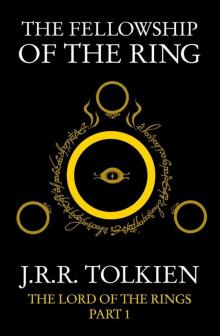 The Fellowship of the Ring
The Fellowship of the Ring The Hobbit
The Hobbit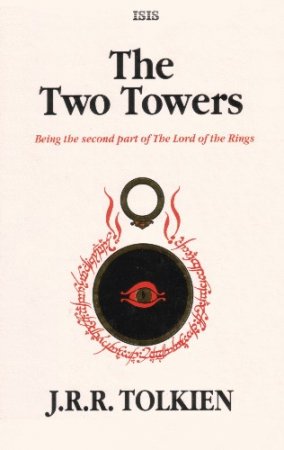 The Two Towers
The Two Towers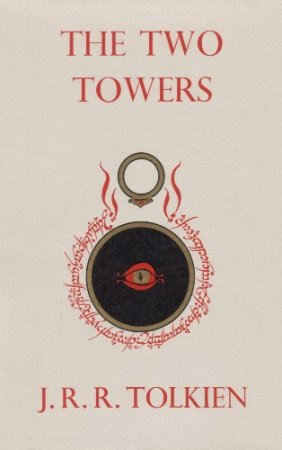 The Return of the King
The Return of the King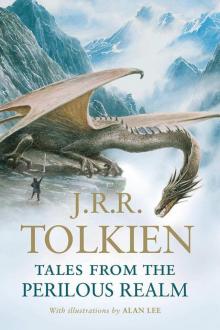 Tales From the Perilous Realm
Tales From the Perilous Realm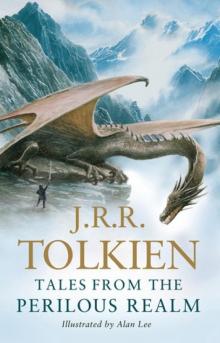 Leaf by Niggle
Leaf by Niggle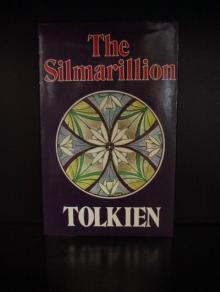 The Silmarillon
The Silmarillon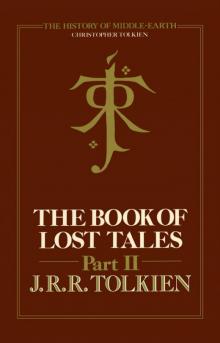 The Book of Lost Tales, Part Two
The Book of Lost Tales, Part Two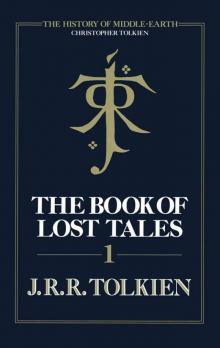 The Book of Lost Tales, Part One
The Book of Lost Tales, Part One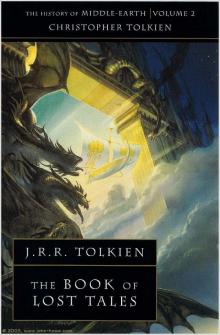 The Book of Lost Tales 2
The Book of Lost Tales 2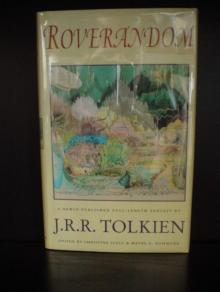 Roverandom
Roverandom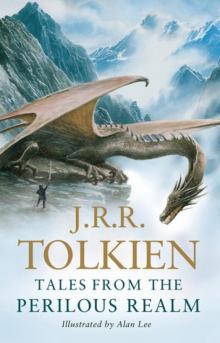 Smith of Wootton Major
Smith of Wootton Major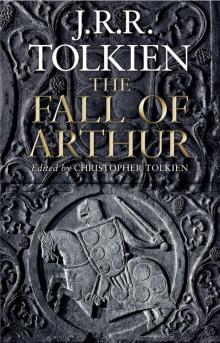 The Fall of Arthur
The Fall of Arthur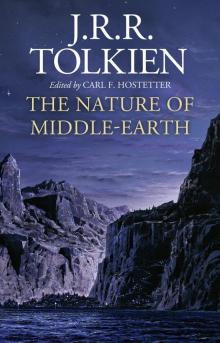 The Nature of Middle-earth
The Nature of Middle-earth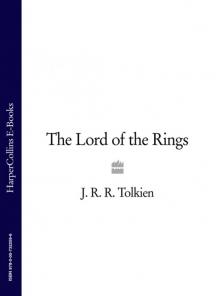 The Lord of the Rings: The Fellowship of the Ring, The Two Towers, The Return of the King
The Lord of the Rings: The Fellowship of the Ring, The Two Towers, The Return of the King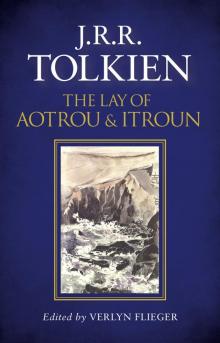 The Lay of Aotrou and Itroun
The Lay of Aotrou and Itroun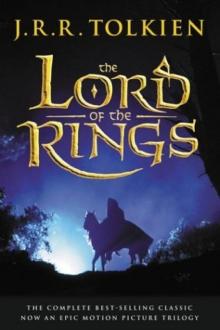 lord_rings.qxd
lord_rings.qxd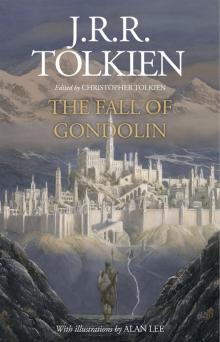 The Fall of Gondolin
The Fall of Gondolin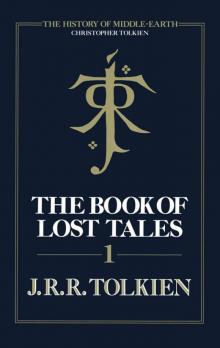 The Book of Lost Tales, Part 1
The Book of Lost Tales, Part 1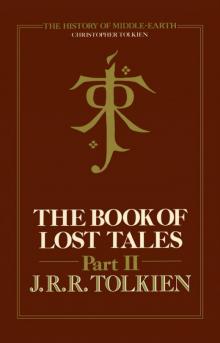 The Book of Lost Tales, Part 2
The Book of Lost Tales, Part 2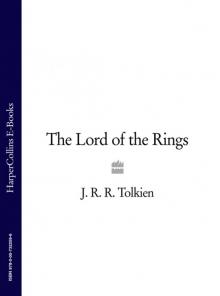 The Lord of the Rings
The Lord of the Rings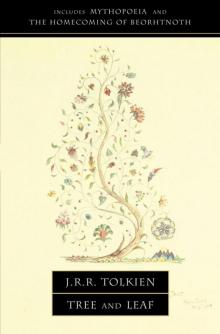 Tree and Leaf
Tree and Leaf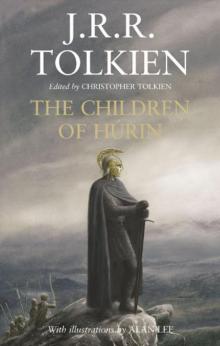 The Children of Húrin
The Children of Húrin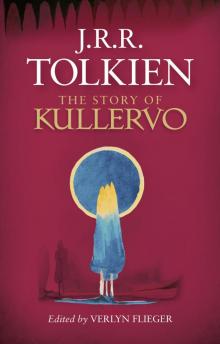 The Story of Kullervo
The Story of Kullervo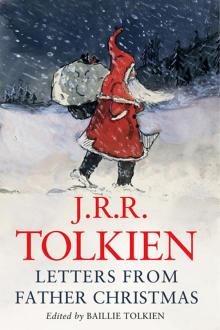 Letters From Father Christmas
Letters From Father Christmas The History of Middle Earth: Volume 8 - The War of the Ring
The History of Middle Earth: Volume 8 - The War of the Ring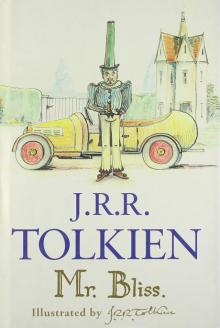 Mr. Bliss
Mr. Bliss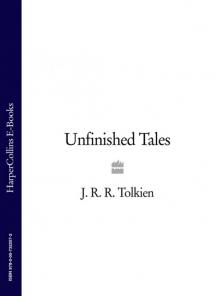 Unfinished Tales
Unfinished Tales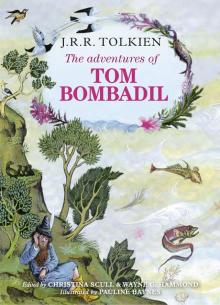 The Adventures of Tom Bombadil
The Adventures of Tom Bombadil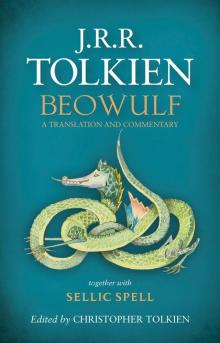 Beowulf: A Translation and Commentary, together with Sellic Spell
Beowulf: A Translation and Commentary, together with Sellic Spell The Silmarillion
The Silmarillion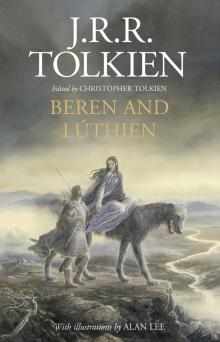 Beren and Lúthien
Beren and Lúthien